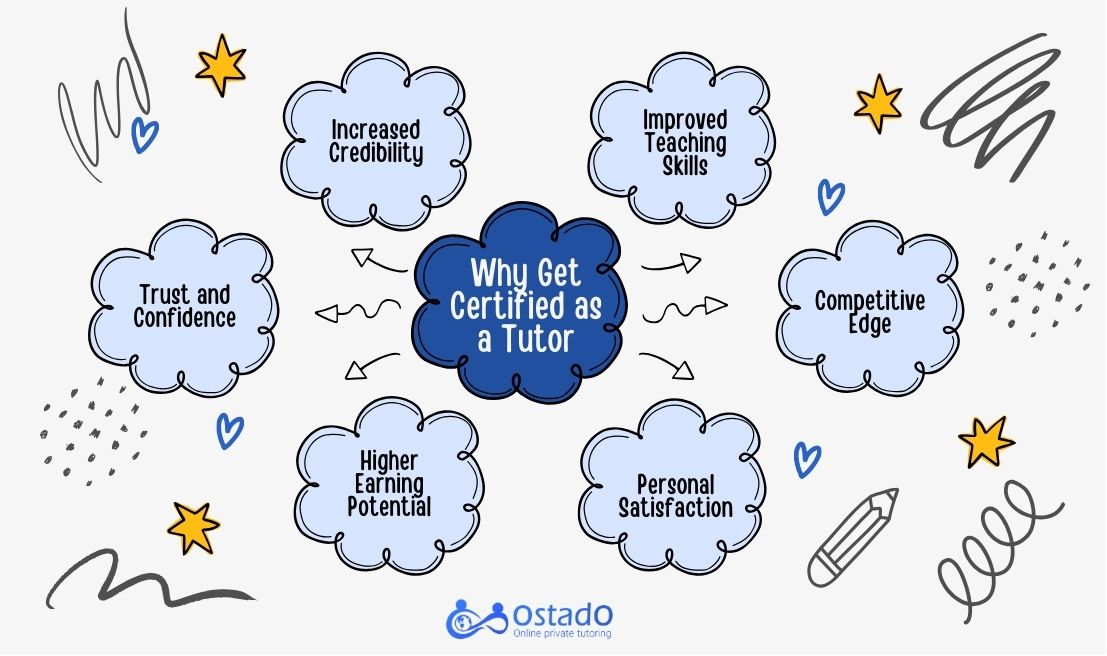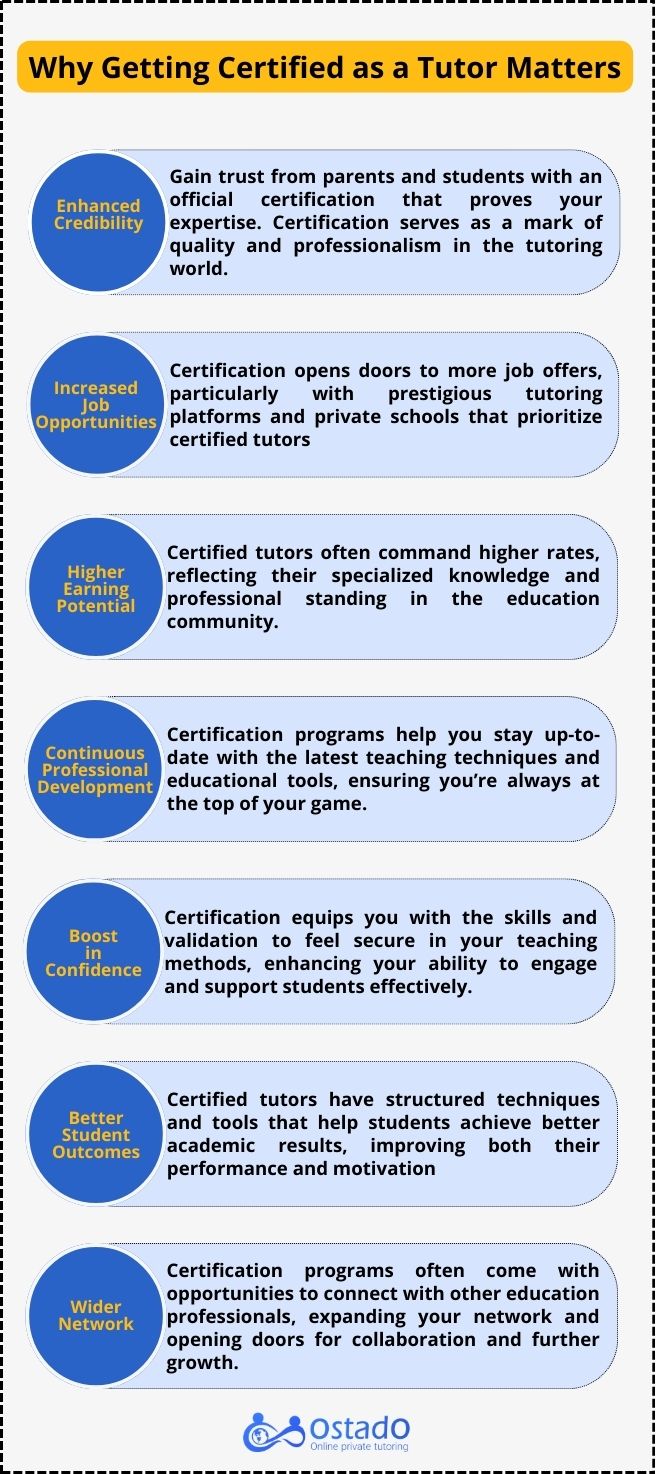Finding a job as a private tutor can be overwhelming, especially if you don’t have an extensive background in the field. Naturally, employers and clients prefer to work with experienced tutors.
So, what can you do to attract employers or clients to your service? You can prove your expertise and impress them by earning tutoring-related certificates. These certificates can also get you promoted if you’re already working as a tutor. But which certificates should you earn? Let’s find out.
Select the Ideal Certification Program
There are many tutoring certificates, and deciding which best serves your interests depends on your objectives and priorities. Before you select a tutoring certificate and attend its course, consider these points:
- Reputation and validation of the certificate
- Coursework and curriculum
- Your time limitations and schedule
- The cost of the program
- Support services after accomplishing the program
Popular Certification Programs For Tutors
|
Top Tutoring Certifications |
||
|
Certificate |
Best for |
Provider |
| Certified Tutor (CT) |
|
National Tutoring Association (NTA) |
| Certified Academic Coach |
|
|
| Associate Level Tutor Certification |
|
College Reading & Learning Association (CRLA) |
| Advanced Level Tutor Certification |
|
|
| Master Tutor Certification |
|
|
| Certified Learning Center Professional-Level I |
|
National College Learning Center Association (NCLCA) |
| Certified Learning Center Professional-Level II |
|
|
| Certified Learning Center Professional-Level III |
|
|
Do I Really Have To Get a Certificate for Tutoring?
Getting a tutoring certificate isn’t a must, at least in the UK. There are many tutors who teach private classes without having a certificate.
Young and novice tutors can showcase their background academic performance and promise excellence to attract clients. On the other hand, professional tutors can rely on years of experience to advance their careers.
Therefore, whether you’re new to tutoring or have a rich background in tutoring, you’ve still got a chance to become a personal or freelance tutor. One way, for instance, is to find a job as an online tutor by registering on an online tutoring platform.
Teach at Ostado Without a Certificate
Ostado is a leading tutoring platform in the UK where tutors with adequate knowledge of the subject they want to teach can find a job. What makes Ostado Unique is that it ensures that every tutor has a client to work with. Become a tutor at Ostado and monetise your expertise.
Benefits of Becoming a Certified Tutor

As you know, degrees and certificates can boost the chance of getting a good job with a reasonable income. As long as you hold a validation, you can guarantee your job opportunities as well as your skills in the field of education. The main advantages of being certified include:
- Establishing your value and profession as a tutor
- More job opportunities as you hold valuable certificates
- Improved communication and teaching skills
- Opportunity for mock sessions and hands-on activities
- Increased income potential

How to Get Certified as a Tutor
A tutoring certificate gives you a theoretical understanding of the career, but you still need to focus on the practical aspects. Before you go on to attend a course and get a certificate, it’s better to familiarise yourself with what’s expected of a certified tutor.
Understand the Basics of Tutoring
The first step is to familiarise yourself with the basics of working as a tutor. In the first place, you should meet the physiological requirements, including:
- Patience
- Confidence
- Empathy
- Communication skills
- Class management skills
- Being passionate about teaching
- Staying updated in this evolving industry
Additionally, tutors should be flexible and adaptable to different teaching methods while utilising various resources to meet each learning style.
Also, taking advantage of online resources allows you to experience a more effective and dynamic learning environment in which students of every age can be motivated to acquire complex subjects.
Meet Education Requirements
Besides the necessary soft skills to be a tutor, becoming a certified teacher requires a strong academic background and knowledge of the field in which you’re considering tutoring.
The hard skills include essential degrees, certification in education or related psychology, and linguistics or TESOL for those who want to work as a language tutor. Some courses and certifications include:
- A Bachelor’s degree in the relevant subject
- Graduate Diploma or Postgraduate Diploma in Education
- A degree in psychology can also be beneficial
- Valid experience in teaching
Click on the “Requirements To Be a Tutor” to read about other prerequisites of being a tutor.
Plan and Complete the Certification Process
In order to streamline your training process as a certified tutor, you’ll need to take some essential steps to have a clear perspective of which programs to choose and how to succeed on the journey. Here are the stages you might consider:
Set Your Objectives and Goals
Setting your career goals helps you have a clear path when training as a teacher while keeping you motivated by streamlining the process of gaining tutoring certification.
Create a Personalised Study Schedule
To make your efforts more effective and ease your progress, set daily time for studying new materials as well as weekly reviewing and practising. Don’t forget to separate complex subjects into simple segments for a better understanding.
Diversify Your Resources
Using various resources and online learning platforms allows you to stay ahead of the program and perform more effectively on final tests and real-life experiences.
Focus on Practical Aspects
A theoretical understanding of tutoring concepts is necessary, but it’s not enough. Conduct mock tutoring sessions, create lesson plans, and apply what you’ve learned in your practices to improve your confidence and gain practical experience.
Join Tutoring Communities
A quick way to learn tutoring is to benefit from professional teachers’ experience. Joining tutoring communities helps you improve your teaching skills and allows you to ask your academic questions and find your answers as soon as possible.
Video Time:
Still curious about becoming a certified tutor? Watch the video for more detailed steps:
Gain Experience in Tutoring
If you are new to the teaching and education industry, the best way to gain professional experience is to join volunteering or internship programs. This will help you practice what you’ve learned in certification programs and also acquire new teaching methods and skills, such as time and class management.
In the same context:
You should also consider advertising your profession. Click on “How To Advertise as a Tutor” to learn how.
Before joining an internship or volunteering program, evaluate the institute’s circumstances to ensure they meet your schedule and career objectives. Choose the company that allows you to improve and showcase your teaching style and creativity to guarantee your motivation in your progress.
Be open to feedback and seek mentors who are available to help you develop your knowledge.
Create a Professional Resume
Creating a professional resume is the key to increasing your job opportunities and boosting your income. Include all your qualifications, certificates, past teaching experience, or other relevant positions to present yourself as a professional tutor who is familiar with the educational and psychological aspects of tutoring. Click here to check out some tutoring resume examples.
Don’t miss the efforts you made in your past experiences to make sure the recruiters know your worth and value.
Conclusion
In conclusion, a certified tutor has a better chance of working with professional institutions and a higher income due to the expertise and knowledge of tutoring. To become a certified tutor, you need to define your career goals, search for suitable certification programs, schedule your study plan, gain teaching or tutoring experience, and finally, promote yourself as a certified tutor.
How To Be a Certified Tutor
- What qualifications do I need to become a certified tutor?Typically, you need a high school diploma, though a bachelor's degree or teaching certification can be advantageous.
- How can I get certified as a tutor?You can get certified through professional organizations like the National Tutoring Association or American Tutoring Association, which offer training and certification programs.
- How long does it take to become a certified tutor?The duration varies by program, but it can typically take a few weeks to several months to complete certification requirements.

